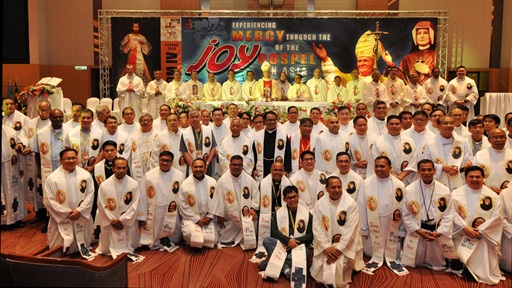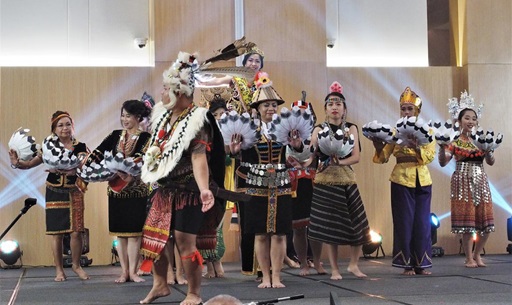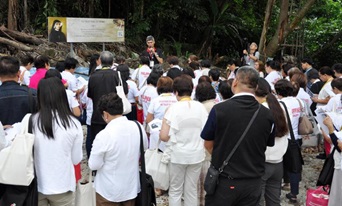
After 11 months of planning, the Church of Divine Mercy, Penang (CDM) was proud to successfully host the 4th Asian Apostolic Congress on Mercy (AACOM 4) from 26th - 28th September, 2018. It was held at the SPICE Convention Center and attracted about 1300 participants from 13 countries in Asia. The theme chosen for the Congress was “Experiencing Mercy through the Joy of the Gospel in Asia”. Among the religious who came were 4 Archbishops, 9 Bishops, 5 Monsignors, 106 priests this is not counting the many nuns and seminarians. At the opening ceremony the officials and religious paraded in followed by the flag waving representatives of the Philippines, Indonesia, Guam (USA), Singapore, Thailand, Vietnam, S. Korea, HongKong, Taiwan, Poland, Vatican and Malaysia. The largest contingent of participants came from the Philippines.
In his welcoming speech, His Excellency, Bishop Ruperto Santos, the Episcopal Coordinator of WACOM (World Apostolic Congress on Mercy) - Asia mentioned that the Divine Mercy devotion is the fastest growing evangelizing force in Asia. Fr Martin Arlando, the Overall Coordinator for AACOM 4 in his opening address explained that the theme of the Congress was chosen in response to the call of His Holiness Pope Francis when he exhorted, “… the joy of the gospel fills the hearts and lives of all who encounter Jesus.” He hoped that everyone at the Congress would achieve what the Holy Father had wished, namely they would be set free from sin, sorrow, inner emptiness and loneliness when they accept God’s offer of salvation. The Holy Father also encourages the Christian faithful to embark upon a new chapter of evangelization marked by the joy of the gospel while pointing out new paths for the Church’s journey in the years to come. Fr Martin concluded by relating a story of a conversation of Jesus with the angel Gabriel in heaven after his Ascension regarding his backup plan for spreading His Word. What if his apostles failed in their mission of spreading God’s love. Jesus simply replies that there is none. He is only depending on all of us. So we are asked to speak and live the truth, be peacemakers and sources of hope in times of distress. He explained that a midst all the worries and sufferings of our lives, we are called to listen and counsel with a spirit of mercy guided by truth and doing what God has called us to do. To reflect the presence of God’s love in the world through his mercy. To make God’s mercy an experience of God’s favour and possess a heart of God that is experiencing the joy of God’ presence in our lives and in others.

Over the 3-day Congress, nine talks were scheduled, each accompanied by personal testimonies of the way the Divine Mercy of God had touched each of their lives. The delegates were given heartfelt stories relating the work and power of God’s Mercy over the different cultures and peoples of Asia.

The first three talks on day began with Msgr Krzysztof Marcjanowicz, the Vatican representative from the Pontifical Council for the promotion of the New Evangelization. The topic of his talk was Mercy in the life and writings of St JPII. He related the struggles of the early life Karol Wojtyla with the loss of his father and elder brothers and the effects of World War II leading towards his life as a Pope. He also mentioned the role he played in granting the sainthood to St Faustina and the decree of the Divine Mercy Sunday as the Sunday following Easter. This was followed by a brief testimony by Dr Tony Dayot from the Philippines.
In the second talk, Fr Simon Pereira from Singapore Redemptorist Order spoke on the topic Mercy in the New Evangelization. He spoke on his experiences reaching out to the people in the streets, prisons, hospitals and even in the pubs. He emphasized that these people are hungry for Mercy. He said that we needed to recharge ourselves and the Spirit will speak to us. He reminded us that God wants not just praise and thanksgiving but also works of mercy, prayers and adoration. In her testimony, Mrs Jennifer Yeo related in detail how the Divine Mercy saved her from a life threatening rare sickness and also gave new life to her youngest son who expected to die in early childhood but is now completing his fifth year in medical college.
In Talk 3, Bishop Ruperto Santos spoke on the topic entitled Mercy and the Sacrament of the Eucharist. He explained how St Faustina was drawn towards the Holy Eucharist early in her life and how she drew strength from it. She also deemed it to be the greatest of all gifts. His Grace went on to explain the four elements of the Eucharist in Divine Mercy, namely the Image of Jesus, the Chaplet, the 3 pm Hour of Mercy prayer and finally the Feast of the Divine Mercy. He reminded us to go frequently for confession and that we must Think of Mercy, Speak of Mercy and Perform Mercy in our lives. In his testimony following this talk, Msgr Josefino S. Ramirez mentioned the pivoting role the Eucharist had played in his priestly vocation.
The Papal Nuncio to Malaysia, His Excellency Archbishop Joseph Salvador Marino graced the occasion to celebrate Mass with the delegates on the evening of the first day. In his homily, he reminded the congregation of the words of the Holy Father, Pope Francis in the proclamation of Mercy “Be merciful, even as your Father is merciful”.
The second day began with a talk by Sr Teresa De La Fuente of the order of the Sisters of Our Lady of Mercy (Poland). She spoke on the topic Mercy in the Life of Consecrated Men and Women. She began by saying that “Jesus loves you”. She said that consecrated people are like road signs that we see. Life on the outside is usually driven by power, money and pleasure but a consecrated life is alien to all these things. They live totally for the Lord and are called to be credible witnesses of the Gospel. They live in the world but not of the world. God is love and love is mercy so they leave the worldly affairs to God’s love and mercy. Everyone is called to this invitation to love as Jesus loves, just by gazing on Jesus on the cross. In her testimony, Sr Diana Kuczek also from the same order as Sr Teresa, related the challenges she faced in picking her vocation. She just trusted in Jesus to see her through the objections she faced from her family and a choice of marriage.
In the fifth talk, Archbishop Anicetus Bongsu A. Singa of Indonesia spoke on Mercy and the Sacrament of Reconciliation. He said that Grace is the greatest attribution of God. His Mercy is greater than our sins. We are called to share in God’s Joy of which there are three dimensions. The first is to totally trust in God’s Mercy. The second is to be merciful to others and lastly to spread the Divine Message message to the world. Peter Chang, a very successful businessman from Indonesia gave a most remarkable testimony of how his wife and his devotion to the Divine Mercy had saved his wife, his daughter and his own life in miraculous ways.
In the sixth talk, Bishop Sebastian Francis of the Penang Diocese spoke on the topic Mercy is a Joyful Mission. He explained the four types of mission. Personal, Family/Community, Ecclesiastical and Ecological missions. He went on the quote St Catherine of Genoa that “Renewal without conversion/metanoia is the corruption of the Church”. He spoke about the conversion process and how the Church is fully equipted with the sacraments, theological virtues, the Word of God and the Gifts/Fruits of the Holy Spirit. He also quoted Pope Francis “ … the only tragedy in life is not to become a saint”. He emphasized that Joy and Mercy cannot be separated to be meaningful in our lives. In her testimony, Elizabeth Simon, a retired nurse, mentioned the many times the Divine Mercy had touched her life and helped her through the loss of her child.
On the third day, after returning from a visit to the Church of Divine Mercy, Penang, Archbishop Simon Poh of Malaysia spoke on the topic Mercy in the Youth Ministry. He began with and lively action song which the delegates all joined in. He gave a definition of Youth and spoke on the current characteristics and dynamics of the youth today. He said that the youth are eager to learn and can accept new ideas. They are also cautious about their health and value their privacy. Most are open to entrepreneurial ventures. He also provided suggestions on how to engage the youth to get their involvement and commitment by way of adopting Divine Mercy programs. He also gave the four elements needed in a Church community namely, the Eucharist, Word of God, Fellowship and Service. He emphasized that Service in the ministries is an important way to draw in the youth and inspire them. He even offered a formula for all to adopt. In the testimony given by a student named Paul Julianose, the healing power of the Divine Mercy was given to him after all his family resources were exhausted to finding a cure. He strongly advocated putting complete trust in the mercy of God in all things.
In the eight talk, Archbishop Michale Jude Byrnes of Guam spoke on the topic Mercy in the Light of Spiritual Considerations. He began by saying that the message in the Bible is that Jesus loves you. He briefly ran through the Old Testament on how we were meant to be partners with God. God made various covenants with man and never gave up on us but continued to work with various individuals to bring us back to him. In the New Testament, Jesus speaks of a new way of living. We need to be merciful, be peacemakers and keep the commandments. Mercy, in the Hebrew translation of that word means an obligation. God takes on an obligation by himself and gives up his life as a cost of it. Mercy is the obligation that Jesus presented to us because of his steadfast love for us. As such we also need to exercise mercy through works of mercy. Fr Joel Delos Reyes then gave testimony of how his recitation of the Divine Mercy chaplet with family helped the recovery of a lady friend in a coma whom doctors had given up all hope of living. He also related how it also helped him to sourced funds to sponsor all the delegates of the Guam Youth Choir to this congress.
The last talk of the congress was done by way of a video feed as Fr Michaelenko Seraphim, the former Rector of the National Shrine of the Divine Mercy in Stockbridge, Massachusetts, USA who was too frail to travel. He gave a lengthy talk on the topic Mercy in the Life and Writings of St Faustina. In the video of the testimony after his talk, a registered nurse by the name of Marie Romagnano spoke of how she was able to allow sick people who need help approach her by wearing a simple badge of the picture of Divine Mercy on the lapel of her uniform. In this way she was able to bring comfort to many of those critically ill and the dying.

In contrast to the other three congresses held before, this congress had planned three unique activities for the delegates. This was to help the delegates experience the Mercy of God and proclaim it through their lives. On the evening of the first day, a candle light procession was held along a kilometer route around the convention center. During this procession led by the Nuncio, the Divine Mercy Chaplet was recited. Eight Malaysian Bishops also joined in the mass and procession as they took time off from their Bishops’ Conference held at this same time in Penang.
On the second day a penitential rite was held. This was done to help delegates receive a plenary indulgence specially granted by the Holy Father for them participating at the Eucharistic celebration, going for Confession and praying for the Holy Father’s intentions. Each delegate was given a certificate in recognition of completing these works.
On the morning of the third day, a trip was organized to CDM to experience a Walk of Mercy around the church. In this Walk of Mercy, the delegates were given the opportunity to reflect on how they could incorporate the Corporal and Spiritual works of mercy in their lives. After that they participated in mass and were able to offer up all their special intentions to the Divine Mercy. Bishop Ruperto Santos presided the mass concelebrating together with a hundred over priests in attendance. The Guam Youth choir performed brilliantly and made this occasion an unforgettable one.
In addition, on the two nights of the congress, the delegates were entertained to various cultural performances from the delegate countries. This was an chance for everyone to appreciate the great diversity of the people that were devoted to the Divine Mercy all over Asia.

 An Adoration room was also prepared for delegates to spend time with the Blessed Sacrament during the time of breaks for tea and lunch. In addition, a room was also provided for any person falling ill, with nurses and a medical doctor in attendance. Many of the participants were full of praise at the efficient level of organization that went on with minor delays due to long speeches and enthusiastic testimonies given. Lost items such as a wallet, rosaries, a room key and jackets were found and returned to grateful people. Delegates were also given the opportunity to purchase religious souvenirs and books at the convention center in between talks. Added to this were two large posters were set up at the entrance to the conference hall. The first was of the Image of the Divine Mercy with St Faustina and JPII and the other of famous local places in Penang. The latter booth was also accompanied with an actual trishaw. This served as photo booths for delegates to remember their stay in Penang.
An Adoration room was also prepared for delegates to spend time with the Blessed Sacrament during the time of breaks for tea and lunch. In addition, a room was also provided for any person falling ill, with nurses and a medical doctor in attendance. Many of the participants were full of praise at the efficient level of organization that went on with minor delays due to long speeches and enthusiastic testimonies given. Lost items such as a wallet, rosaries, a room key and jackets were found and returned to grateful people. Delegates were also given the opportunity to purchase religious souvenirs and books at the convention center in between talks. Added to this were two large posters were set up at the entrance to the conference hall. The first was of the Image of the Divine Mercy with St Faustina and JPII and the other of famous local places in Penang. The latter booth was also accompanied with an actual trishaw. This served as photo booths for delegates to remember their stay in Penang.
Organizers took every effort to help all delegates have a truly faith uplifting experience. Each day, sessions were paused at 3 pm for the recitation of the Holy Hour of Mercy Prayer followed by the Chaplet. In appreciation of the participation of priests in the distribution of the holy Eucharist during three masses and also in carrying out Confessions, they were each given a specially designed stole bearing the images of St Faustina and JPII. This stole was such a prized item that many priests even purchased more of them for their fellow priests who were unable to attend this congress.
The Organizing Committee which had more that 200 volunteers helping out for the duration received much praise for this “best Congress ever”. The Vatican officials marveled at the level of cooperation and camaraderie among volunteers going about their duties. A bishop from Thailand admitted that organizing this congress was not an easy task as they had organized AACOM 2. They were pleased to see that the organizers were brave to deviate from the norm and include experiences focusing on current needs. Fr Paul Zawadski, a priest from Poland but now serving in Korea express “jealousy” at the efficient and smooth running of the Congress in despite of earlier setbacks. He was kept busy video tapping the proceeds of the congress for his faithful back in Korea. A comment from a young member of the Guam Youth choir was that the Congress was “great fun”.
A raise of cheer went out at the closing ceremony when Bishop Santos, the Asian Episcopal Coordinator Wacom-Asia announced HongKong as the next venue of the 5th Congress. Fr Martin Arlando, the Overall Coordinator for AACOM 4 remarked that for a small parish like CDM Penang to be able to organize such an international congress in this short space of time, HongKong would, with the help of God’s grace, be able to achieve the same success. All they needed was to Trust in Jesus.
Written by
Dr. Ivan Filmer
8th October, 2018.

